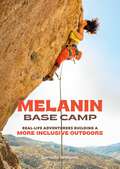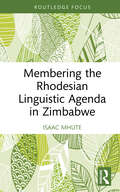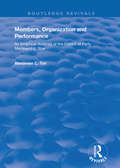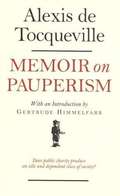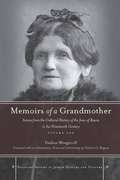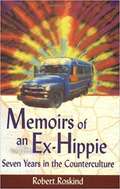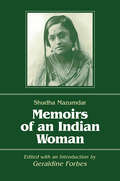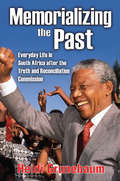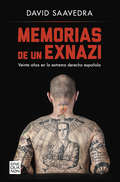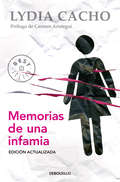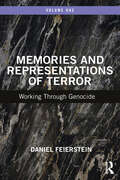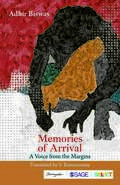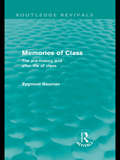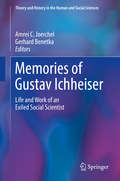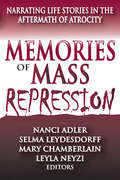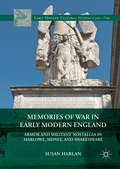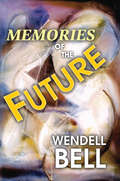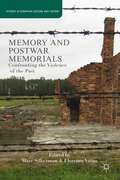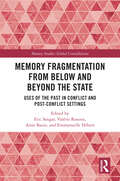- Table View
- List View
Melanin Base Camp: Real-Life Adventurers Building a More Inclusive Outdoors
by Danielle WilliamsBeautiful, empowering, and exhilarating, Melanin Base Camp is a celebration of underrepresented BIPOC adventurers that will challenge you to rethink your perceptions of what an outdoorsy individual looks like and inspire you to being your own adventure. Danielle Williams, skydiver and founder of the online community Melanin Base Camp, profiles dozens of adventurers pushing the boundaries of inclusion and equity in the outdoors. These compelling narratives include a mother whose love of hiking led her to found a nonprofit to expose BIPOC children to the wonders of the outdoors and a mountain biker who, despite at first dealing with unwelcome glances and hostility on trails, went on to become a blogger who writes about justice and diversity in natural spaces. Also included is a guide to outdoor allyship that explores sometimes challenging topics to help all of us create a more inclusive community, whether you bike, climb, hike, or paddle. Join us as we work together to increase representation and opportunities for people of color in outdoor adventure sports.
Meltdown: Why Our Systems Fail and What We Can Do About It
by Chris Clearfield András TilcsikA groundbreaking take on how complexity causes failure in all kinds of modern systems—from social media to air travel—this practical and entertaining book reveals how we can prevent meltdowns in business and life.A crash on the Washington, D.C. metro system. An accidental overdose in a state-of-the-art hospital. An overcooked holiday meal. At first glance, these disasters seem to have little in common. But surprising new research shows that all these events—and the myriad failures that dominate headlines every day—share similar causes. By understanding what lies behind these failures, we can design better systems, make our teams more productive, and transform how we make decisions at work and at home. Weaving together cutting-edge social science with riveting stories that take us from the frontlines of the Volkswagen scandal to backstage at the Oscars, and from deep beneath the Gulf of Mexico to the top of Mount Everest, Chris Clearfield and András Tilcsik explain how the increasing complexity of our systems creates conditions ripe for failure and why our brains and teams can't keep up. They highlight the paradox of progress: Though modern systems have given us new capabilities, they've become vulnerable to surprising meltdowns—and even to corruption and misconduct. But Meltdown isn't just about failure; it's about solutions—whether you're managing a team or the chaos of your family's morning routine. It reveals why ugly designs make us safer, how a five-minute exercise can prevent billion-dollar catastrophes, why teams with fewer experts are better at managing risk, and why diversity is one of our best safeguards against failure. The result is an eye-opening, empowering, and entirely original book—one that will change the way you see our complex world and your own place in it.
Meltdown: Why Our Systems Fail and What We Can Do About It
by Chris Clearfield András TilcsikA groundbreaking take on how complexity causes failure in all kinds of modern systems--from social media to air travel--this practical and entertaining book reveals how we can prevent meltdowns in business and life"Endlessly fascinating, brimming with insight, and more fun than a book about failure has any right to be, Meltdown will transform how you think about the systems that govern our lives. This is a wonderful book."--Charles Duhigg, author of The Power of Habit and Smarter Faster BetterA crash on the Washington, D.C. metro system. An accidental overdose in a state-of-the-art hospital. An overcooked holiday meal. At first glance, these disasters seem to have little in common. But surprising new research shows that all these events--and the myriad failures that dominate headlines every day--share similar causes. By understanding what lies behind these failures, we can design better systems, make our teams more productive, and transform how we make decisions at work and at home.Weaving together cutting-edge social science with riveting stories that take us from the frontlines of the Volkswagen scandal to backstage at the Oscars, and from deep beneath the Gulf of Mexico to the top of Mount Everest, Chris Clearfield and András Tilcsik explain how the increasing complexity of our systems creates conditions ripe for failure and why our brains and teams can't keep up. They highlight the paradox of progress: Though modern systems have given us new capabilities, they've become vulnerable to surprising meltdowns--and even to corruption and misconduct.But Meltdown isn't just about failure; it's about solutions--whether you're managing a team or the chaos of your family's morning routine. It reveals why ugly designs make us safer, how a five-minute exercise can prevent billion-dollar catastrophes, why teams with fewer experts are better at managing risk, and why diversity is one of our best safeguards against failure. The result is an eye-opening, empowering, and entirely original book--one that will change the way you see our complex world and your own place in it.
Membering the Rhodesian Linguistic Agenda in Zimbabwe
by Isaac MhuteMembering the Rhodesian Linguistic Agenda in Zimbabwe reports on a study carried out in Zimbabwe to ascertain the degree and effect of honouring the colonial linguistic agenda. The book employs an interpretivist philosophy and qualitative research approach that relies on participatory observations, interviewing purposively sampled informants and focus group discussions involving snowball sampled graduates. It was inspired by the Critical Language Policy Theory that considers language choice a critical determinant factor in how communities are administered politically, economically, socioculturally and educationally. It establishes that whereas linguistic imperialism meant to serve as the lifeblood of the Southern Rhodesian colonial machine, the former coloniser ensured coloniality in Zimbabwe by presenting the English language as a sacred media in political, economic, sociocultural and educational settings forever. The study establishes that the only way Zimbabwe and other such post-colonies could find redemption is by eradicating the sacredness of former colonisers’ languages by adding value to all their languages and the indigenous knowledge systems associated with them. It also demonstrates that the bigger the delay, the more is irretrievably lost together with custodians of the languages. This book will be informative for undergraduates, postgraduates and researchers in linguistics, communication, sociology, anthropology and history. It may also serve well as a resource to government researchers, politicians and other policymakers.
Members, Organizations and Performance: An Empirical Analysis of the Impact of Party Membership Size (Routledge Revivals)
by Alexander C. TanThis title was first published in 2000. The author offers a contribution to the ongoing debate on the rise of the cartel party in democratic systems of government. His study examines the question of whether the decline in party size impacts democratic development and concludes by discussing implications for the future.
Memoir on Pauperism
by Alexis De Tocqueville Seymour DrescherIn this neglected memoir, written just after the first volume of Democracy in America, Tocqueville seeks to understand why the impoverished countries of Europe in his time had the fewest paupers, while the most opulent nation England had the most.
Memoirs of a Grandmother: Scenes from the Cultural History of the Jews of Russia in the Nineteenth Century (Volume #1)
by Pauline Wengeroff Shulamit S. MagnusIn Volume 1 of Memoirs of a Grandmother, Wengeroff depicts traditional Jewish society, including the religious culture of women, during the reign of Tsar Nicholas I, who wished "his" Jews to be acculturated to modern Russian life. Translated by Shulamit S. Magnus.
Memoirs of an Ex-Hippie: Seven Years in the Counterculture
by Robert Roskind<p>The counterculture of the 60s and 70s has been viewed as everything from naive to hedonistic. However, most of these views were formed by observing the movement from the outside. <i>Memoirs of an Ex-Hippie</i> offers a vastly different perspective, one developed from within. <p>After graduating college in 1968, Robert Roskind hit the road for seven years. Roskind's travels lead him into the heart of the counterculture--to Esalen Institute, Tassajara Hot Springs, Big Sur, Vancouver Island, the communes of Oregon and North Carolina, Altamont Pop Festival, Mt. Shasta, the Haight-Ashbury and the "motherland"--Northern California. <p>His personal odyssey, sometimes profane and funny, sometimes profound and serious, reveals this tumultuous era as a cultural and spiritual renaissance that birthed many of the solutions to problems humanity now faces.
Memoirs of an Indian Woman (Foremother Legacies Ser.)
by Geraldine Hancock Forbes Shudha MazumdarThis vivid memoir recounts the experience of Shudha Mazumdar, a woman born at the turn of the century to Indian parents whose ideas on child rearing differed greatly. Her father, a wealthy Europeanized Zamindar, tried to instill Western values, while Shudha's mother emphasized the traditional, even going as far as arranging a marriage for her daughter when she was thirteen. Although true to Indian traditions, Shudha eventually manifested her father's influence by becoming a published writer, by becoming a member of a number of social service organizations, and by serving as the Indian Delegate to the International Labour Organization.
Memorializing the Past: Everyday Life in South Africa After the Truth and Reconciliation Commission
by Heidi GrunebaumThis work is a meditation on the shaping of time and its impact on living with and understanding atrocity in South Africa in the wake of the Truth and Reconciliation Commission (TRC). It is an examination of the ways that the institutionalization of memory has managed perceptions of time and transition, of events and happenings, of sense and emotion, of violence and recovery, of the past and the new. Through this process a public language of memory has been carved into collective modes of meaning. It is a language that seems deprived of the hopes, dreams, and possibilities for the promise of a just and redemptive future it once nurtured.Truth commissions are profoundly implicated in the social politics of memorialization. Memory, as a conceptual, historical, and experiential discourse about the past, relates to the ways in which cruelty is integrated into societal understandings, which include cognitive and philosophic frameworks and constructions of social meaning. The politics of historical truth, of memory and of justice, play out in unintended ways. There is not only the ongoing struggle for survivors of state terror, but also the ways that the everyday shapings of silences, the emptiness of reconciliation and the fracturing of hope remain embedded in political life.
Memorias de un exnazi: Veinte años en la extrema derecha española
by David SaavedraEl libro del programa "X Nazi" de Lo de Évole. Memorias de un exnazi relata, en primera persona, la trascendental experiencia del autor en el interior de la burbuja nazi española y cómo consiguió salir de ella. Un testimonio único y revelador en el marco de los grupos nazis y de la extrema derecha más radical de nuestro país, pero extensible a todo proceso de radicalización. «Admiré la Alemania que creó Adolf Hitler. Me rapé el pelo al cero y adopté la estética skinhead. Me tatué la espalda con un enorme retrato de Rudolf Hess, lugarteniente del Führer. Contribuí a crear diversos grupos NS, nacionalsocialistas. Me preparé físicamente para la batalla, participando en entrenamientos físicos extremos en la sierra de Madrid. Igual de rápido que ascendí hasta la cima de la organización, me despeñé por un precipicio que me situó a las puertas del terrorismo. Un día empecé a dudar. Inicié un proceso que arrasó mi identidad. El alcoholismo y el cañón de una pistola metido en la boca fueron la señal de que había tocado fondo. Si hace diez años me hubieran dicho que acabaría escribiendo este libro, sin lugar a dudas me habría arrojado de un puente para evitarlo. Decir que pasé dos décadas en la ultraderecha no reflejaría lo que viví. Fue mucho más que asumir una ideología. Disfrazado de ideología política, el fanatismo amenaza con volver a irrumpir en nuestra sociedad. Es posible detenerlo.»
Memorias de una infamia
by Lydia CachoLydia Cacho cuenta por primera vez su vida y narra, de manera descarnada, la conspiración de Kamel Nacif y Mario Marín, quienes se unieron para acorralar a una ciudadana cuyo único delito fue denunciar la pederastia. En esta historia íntima, personal y pública, se describe la venganza de los demonios del edén: el secuestro, la tortura, las amenazas y los abusos policiales. Ésta es la memoria desgarrada del caso que ha cimbrado a México, desnudando la corrupción, las complicidades, la protección y las alianzas tejidas entre el poder político y el poder económico. Memorias de una infamia es el recuento de una vida entregada con pasión y fortaleza a los otros. Una historia que se conoce a medias y debe conocerse entera, porque sólo ha trascendido una pequeña porción de los oprobios que el poder ha desencadenado en contra de las víctimas y de quienes las han defendido.
Memorias de una infamia
by Lydia CachoLydia Cacho cuenta por primera vez su vida y narra, de manera descarnada, la conspiración de Kamel Nacif y Mario Marín, quienes se unieron para acorralar a una ciudadana cuyo único delito fue denunciar la pederastia. En esta historia íntima, personal y pública, se describe la venganza de los demonios del edén: el secuestro, la tortura, las amenazas y los abusos policiales. Ésta es la memoria desgarrada del caso que ha cimbrado a México, desnudando la corrupción, las complicidades, la protección y las alianzas tejidas entre el poder político y el poder económico. Memorias de una infamia es el recuento de una vida entregada con pasión y fortaleza a los otros. Una historia que se conoce a medias y debe conocerse entera, porque sólo ha trascendido una pequeña porción de los oprobios que el poder ha desencadenado en contra de las víctimas y de quienes las han defendido. "Lydia Cacho nos deja aquí el testimonio más íntimo y personal que haya concedido jamás, santo y seña de una vida luminosa y recordatorio perenne de que nadie tiene derecho a rendirse. Es aquí donde Lydia abre su alma y su memoria, arroja luces, despeja dudas y reafirma convicciones. Este es el relato que nos faltaba. " Del prólogo de Carmen Aristegui
Memories and Representations of Terror: Working Through Genocide
by Daniel FeiersteinMemories and Representations of Terror: Working Through Genocide explores how memories and representations shape our understanding of historical events, particularly the ways in which societies create narratives about genocide and its aftermath, using Argentina’s last military dictatorship (1976–1983) and its contested legacy as a case study. Feierstein examines how memories and representations of genocide are the terrain in which both the strategic objectives of genocide and the possibilities of challenging those objectives are contested. These memories and representations provide the foundation upon which critical judgments about the past are constructed and offer the potential for assuming responsibility and working through the consequences of genocide. This book proposes that terror continues to hijack the actions and identities of surviving societies via a process of the construction of memories and social representations of the lived experience in a final stage of genocide Feierstein terms "symbolic enactment". In doing so, Feierstein examines the contributions of various disciplines to comprehending memory processes and social representations. It covers a range of topics, from the nature of memory based on the neuroscientific discoveries of the last half-century to psychoanalytic theories on the functioning of the mind, including the role of psychic defense mechanisms, the unconscious mind, collective pacts of denial and different forms of desensitization. It also explores historiographical debates between forms of history and forms of memory, as well as sociological contributions to the analysis of social frames of memory, cultural memory, generational transmission and related issues. The first volume of a three-volume work that aims to identify and evaluate the various consequences of genocidal social practices and the possibility of healing the scars left on individuals’ subjectivities and the social fabric by genocide. This book is essential reading for students and academics in the humanities and social sciences with an interest in genocide, collective memory and identity.
Memories of Arrival: A Voice from the Margins
by Adhir Biswas V. RamaswamyTranslated for the first time into English, Memories of Arrival brings together four books of a migrant’s story of displacement and exile in one volume. Adhir Biswas, a Dalit, makes the subalterns gain some visibility. The author, though half-starved, gets an education. He finds possibilities, delighting in the city of Calcutta, making the most of what he can. He finds a place in the book world, finally emerging as the distinguished editor and publisher of Gangchil and Doel. Adhir Biswas writes quietly and tersely, with much unsaid, to depict a life where the past and the present keep coalescing with dreams of the old place and the dreaminess of the new land. His story has much in common with that of migrants who leave a village or a small town to come to a big city and live in its shadows.
Memories of Class: The Pre-history and After-life of Class (Routledge Revivals)
by Zygmunt BaumanFirst published in 1982, Professor Bauman’s discussion of the mechanism of class formation and institutionalisation of class conflict argues that our understanding of changes in social and political structure has been hindered by the freezing of concepts of class in the ice-age of industrial society. He investigates the impact of historical memory on the early transformation of rank into a class society, and on the current confusion in the analysis of the ‘crisis of late-industrial society’. The book traces the formation of a class society back to the patterns of ‘surveillance power’ and control, and shows how these patterns preceded and made possible the industrial system. Subsequently ‘economised’ into the industrial system, these same patterns of control have now proved to be inadequate under social conditions brought about by this economisation of the power conflict.
Memories of Gustav Ichheiser: Life And Work Of An Exiled Social Scientist (Theory And History In The Human And Social Sciences Ser.)
by Amrei C. Joerchel Gerhard BenetkaThis book presents an overview of the life and work of Gustav Ichheiser, a social scientist in Vienna during the early 20th century. Gustav Ichheiser, along with many other Austrian Jews of his time, was forced into exile after the rise of National Socialism in Europe. Ichheiser's work is considered an important front runner to the attribution theories. He was one of the first to study the phenomena of social misunderstandings in detail and in relation to concrete problem areas, such as success. The aim of this book is to discuss, on an international level, the importance of Ichheiser's theoretical approaches in his time and their relevance in today's context of social and cultural psychology. In addition, the tragic course of Ichheiser’s biography, an example for many displaced scientists, highlights the importance of bringing a scientist’s work back into the focus of today’s current social scientific setting. Memories of Gustav Ichheiser will be of interest to researchers as well as undergraduate and graduate students in the fields of psychology, social psychology, sociology, and psychiatry.
Memories of Mass Repression: Narrating Life Stories in the Aftermath of Atrocity
by Nanci Adler Mary Chamberlain Selma Leydesdorff Leyla NeyziMemories of Mass Repression presents the results of researchers working with the voices of witnesses. Its stories include the witnesses, victims, and survivors; it also reflects the subjective experience of the study of such narratives. The work contributes to the development of the field of oral history, where the creation of the narrative is considered an interaction between the text of the narrator and the listener. The contributors are particularly interested in ways in which memory is created and molded. The interactions of different, even conflicting, memories of other individuals, and society as a whole are considered. In writing the history of genocide, -emotional- memory and -objective- research are interwoven and inseparable. It is as much the historian's task to decipher witness account, as it is to interpret traditional written sources. These sometimes antagonistic narratives of memory fashioned and mobilized within public and private arenas, together with the ensuing conflicts, paradoxes, and contradictions that they unleash, are all part of efforts to come to terms with what happened. Mining memory is the only way in which we can hope to arrive at a truer, and less biased historical account of events. Memory is at some level selective. Most believers in political movements turned out to be the opposite of what they promised. When given a proper forum, stories that are in opposition to dominant memories, or in conflict with our own memories, can effectively battle collective forgetting. This volume offers the reader a vision of the subjective side of history without falsifying the objective reality of human survival.
Memories of War in Early Modern England
by Susan HarlanThis book examines literary depictions of the construction and destruction of the armored male body in combat in relation to early modern English understandings of the past. Bringing together the fields of material culture and militarism, Susan Harlan argues that the notion of "spoiling" - or the sanctioned theft of the arms and armor of the vanquished in battle - provides a way of thinking about England's relationship to its violent cultural inheritance. She demonstrates how writers reconstituted the spoils of antiquity and the Middle Ages in an imagined military struggle between male bodies. An analysis of scenes of arming and disarming across texts by Christopher Marlowe and William Shakespeare and tributes to Sir Philip Sidney reveals a pervasive militant nostalgia: a cultural fascination with moribund models and technologies of war. Readers will not only gain a better understanding of humanism but also a new way of thinking about violence and cultural production in Renaissance England.
Memories of the Future
by Wendell BellLife courses, both professional and personal, are often directed by unplanned experiences. At crossroads, which path is followed and which hard choices are made can change the direction of one's future. Wendell Bell's life illustrates how totally unforeseen events can shape individual lives. As he notes, despite our hopes and our plans for the future, there is also serendipity, feedback, twists and turns, chance and circumstance, all of which shape our futures with sometimes surprising results. In Bell's case, such twists and turns of chance and circumstance led to his role in developing the new field of futures studies. In Memories of the Future, Bell recognizes the importance of images of the future and the effect of these images on events to come. Such images-dreams, visions, or whatever we call them-help to determine our actions, which, in turn, help shape the future, although not always in ways that we intend. Bell illustrates, partly with the story of his own life, how people remember such past images of the future and how the memories of them linger and are often used to judge the real outcomes of their lives. This is a fascinating view of the work of an important social scientist and the people and events that helped define his life. It is also about American higher education, especially from the end of World War II through the 1960s and 1970s, a period of educational transformation that included the spread of the merit system; the increase in ethnic, racial, gender, and social diversity among students and faculty; and a massive increase in research and knowledge.
Memories, Dreams, Reflections: An Autobiography
by Carl JungFour years before his death, Carl Gustav Jung, psychiatrist and psychologist, began writing his life story. But what started as an exercise in autobiography soon morphed into an altogether more profound undertaking. The result is an absorbing piece of self-analysis; a frank statement of faith, philosophy and principles from one of the great explorers of the human mind. Covering everything from Sigmund Freud, analytical psychology and Jungian dream interpretation to a forthright discussion of world myths and religions, including Christianity, Buddhism, and other faiths, Memories, Dreams, Reflections is a remarkable book showing a man of great depth, humility and perspicacity. Once read it is never forgotten.
Memory And Postwar Memorials
by Marc Silberman Florence VatanThe twentieth century witnessed genocides, ethnic cleansing, forced population expulsions, shifting borders, and other disruptions on an unprecedented scale. This book examines the work of memory and the ethics of healing in post authoritarian societies that have experienced state-perpetrated violence.
Memory Fragmentation from Below and Beyond the State: Uses of the Past in Conflict and Post-Conflict Settings (Memory Studies: Global Constellations)
by Eric Sangar, Valérie Rosoux, Anne Bazin, and Emmanuelle HébertThis volume suggests a model of collective memory that distinguishes between two conceptual logics of memory fragmentation: vertical fragmentation and horizontal fragmentation. It offers a series of case studies of conflict and post-conflict collective memory, shedding light on the ways various actors participate in the production, dissemination, and contestation of memory discourses. With attention to the characteristics of both vertical and horizontal memory fragmentation, the book addresses the plurality of diverging, and often conflicting, memory discourses that are produced within the public sphere of a given community. It analyzes the juxtaposition, tensions, and interactions between narratives produced beyond or below the central state, often transcending national boundaries. The book is structured according to the type of actors involved in a memory fragmentation process. It explores how states have been trying to produce and impose memory discourses on civil societies, sometimes even against the experiences of their own citizens, and how such efforts as well as backlash from actors below and beyond the state have led to horizontal and vertical memory fragmentation. Furthermore, it considers the attempts by states’ representatives to reassert control of national memory discourses and the subsequent resistances they face. As such, this volume will appeal to sociology and political science scholars interested in memory studies in post-conflict societies.
